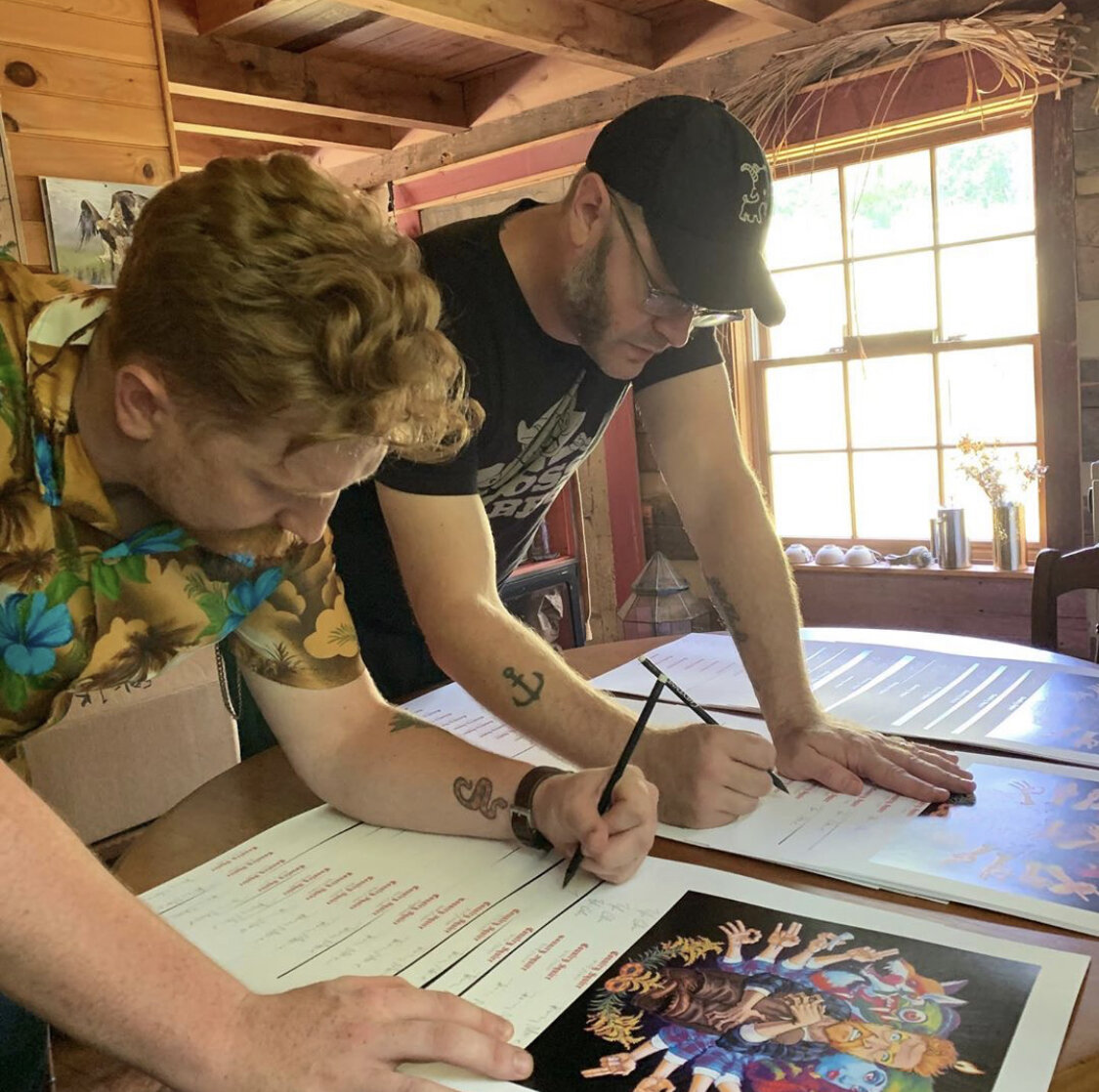MODERN OUTLAWS: STURGILL SIMPSON AND TYLER CHILDERS MOVE TO THE WORLD STAGE
By Michael Phillips
Much like there is no one way to define Kentucky, there is certainly no one way to define the vibrant and creative spirit of Appalachia. From reviving classic outlaw music to feature length anime films, two Kentucky musicians are harnessing their talents to take a wrecking ball to the prevailing narrative about their homeland.
Sturgill Simpson announced on September 30 that he plans to conduct a full-fledged tour with fellow Kentuckian and country music star Tyler Childers in 2020. While both come from Eastern Kentucky, they have built distinct sounds and positioned themselves uniquely in the country music universe. At the same time, though, they’re eager to collaborate, with Simpson stating:
We haven’t played in a year and we’re going back and working up material we recorded two-and-a-half years ago. We don’t really rehearse, we just knock the rust off.
Both musicians fight against common caricatures projected onto the state. But in order to understand fully how they resist these recurring stereotypes, it’s important to look at where they came from.
Sturgill Simpson and the Art of Reinvention
Sturgill Simpson’s meteoric rise in the country music industry over the past few years is hardly a surprise to anyone familiar with his upbringing in Jackson, Kentucky.
While his parents didn’t work in the mines, Simpson’s family had practically a century-long lineage of working in coal. Moreover, Simpson was the first man through his mother’s side of his family not to work as a coal miner. As a result, much of his musical catalog deals with the economic disparities and hardships that Eastern Kentuckians face as coal mining continues to decline.
After graduating high school, he took another path familiar to many rural Kentuckians and decided to join the military. His career in the military took him to Japan, among other places, and his worldview began to broaden – and darken. After witnessing extreme instances of poverty in Southeast Asia, he became disaffected and left the military. After a brief stint living in the Pacific Northwest, he eventually drifted back to Kentucky, where in the early 2000s he started to take music more seriously. Literally getting back to his roots, Simpson began blurring the lines between bluegrass and outlaw country, a unique contribution to mainstream country music that has brought Kentucky’s contributions to the genre back to the forefront.
Courtesy of Pitchfork
In the early 2010s, he moved to Nashville to become a full-time musician. Despite his first album receiving a criminally small amount of attention, Simpson’s second independent album Metamodern Sounds in Country Music thrust him into the national spotlight. He would continue this momentum in 2016 with A Sailor’s Guide to Earth, which would ultimately win a Grammy.
Now that he has firmly established himself as an authority in the genre, he’s been able to funnel his creativity through more unconventional and unexpected outlets – like anime and rock music. His 2019 album Sound and Fury departs fully from his previous success in outlaw country music and instead features a decidedly heavier rock and synth-oriented sound. The LP also features as the foundation for an accompanying Netflix original anime film that explores themes of systematic oppression, corporate dominance, and political corruption.
On the subject of Kentucky’s place in the music world, Simpson recently told the New York Times that “Musically speaking this is the most culturally rich pocket of American existence outside of jazz.” Even though he’s exploring new creative ventures, he still works tirelessly to use his platform to elevate Kentucky…and other Kentucky musicians like Tyler Childers.
Tyler Childers Redefines a Region
Tyler Childers has garnered critical and popular attention from the lived experiences that inform his music. As a country music artist from Eastern Kentucky, he opens up about the increasing economic hardships of the region, the complicated relationship that he has with religion, and the ways that drug abuse has affected his community with sobering authenticity.
Courtesy of Rolling Stone
In an interview with RNZ, he further elaborated on how the coal industry employed his father and helped “put food on my table growing up.” But, his father is also among the many people who have since lost their jobs in the mines. With all of this economic turmoil, Childers has used music as an effective vehicle to highlight these experiences directly.
His unique contribution to country music, which the Rolling Stone calls “a fusion of folk, bluegrass and country with a raw, emotionally-gripping tinge that’s halfway between a confession and a holler,” has enabled him to tour and open for major projects like Willie Nelson, Jack White, John Prine, and Sturgill Simpson.
In the same Rolling Stone interview, he recalls the moment when Diane Sawyer, a Louisville native, came to the Appalachian part of the state to film a segment on “Mountain Dew Mouth.” Other media outlets at the time found the segment divisive and exploitative, and the moment acted as an inspiration for Childers. He was disgusted that the segment highlighted and reinforced stereotypes of his home state and region, and since then, he has been committed to illuminating the major social and political complexities of Eastern Kentucky.
Armed with a clear motivation and a narrowed message, he spent the first several years of his adult life taking risks and perfecting his sound. Ultimately, Childers got his big break in part because of Simpson’s intervention. According to an interview with the Guardian, he met Simpson’s drummer Miles Miller after he played a set in Nashville. After his next show, Simpson approached him with a proposition to collaborate.
After Childers shared a demo, Simpson thought that the writing was stellar but that the production didn’t do his music justice. As a result, Simpson ended up recording Childers’ breakout album Purgatory, which reached 17 on the US country charts. Childers would build off that success to write and release Country Squire, which Simpson would also produce. The album would peak at number one on Billboard’s Top Country Albums.
And to really bring things home, the cover and insert art for Childer’s Country Squire was drawn by none other than our October 2019 featured speaker, Tony Moore.
In the video below, you can hear Tony try to articulate just what is is about Kentucky that keeps the spirit of the outlaw alive across many forms of creative media:
Hear more about Tony’s life, career, and unexpected friends from Kentucky on October 23 at The Kentucky Center for the Performing Arts.







